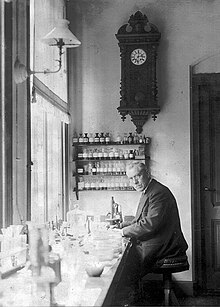Martinus Beijerinck: Difference between revisions
Appearance
Content deleted Content added
m Reverted edits by 216.56.42.70 to last revision by ClueBot (HG) |
No edit summary |
||
| Line 32: | Line 32: | ||
'''Martinus Willem Beijerinck''' (March 16, 1851 – January 1, 1931) was a [[Netherlands|Dutch]] [[microbiologist]] and [[botanist]]. He was born in [[Amsterdam]]. |
'''Martinus Willem Beijerinck''' (March 16, 1851 – January 1, 1931) was a [[Netherlands|Dutch]] [[microbiologist]] and [[botanist]]. He was born in [[Amsterdam]]. |
||
Beijerinck studied at [[Leiden |
|||
Beijerinck studied at [[Leiden University]] and became a teacher in microbiology at the Agricultural School in Wageningen (now [[Wageningen University]]) and later at the ''Polytechnische Hogeschool Delft'' ([[Delft]] [[Institute of technology#Belgium and the Netherlands|Polytechnic]], currently [[Delft University of Technology]]) (from 1895). He established the [[Delft School of Microbiology]]. His studies of agricultural microbiology and industrial microbiology yielded fundamental discoveries in the field of [[biology]]. His achievements have been perhaps unfairly overshadowed by those of his contemporaries [[Robert Koch]] and [[Louis Pasteur]], because unlike them, Beijerinck never studied human disease. |
|||
He is considered the founder of [[virology]]. In 1898, he used filtration experiments to show that [[tobacco mosaic disease]] is caused by an agent smaller than a [[bacterium]]. He named that new [[pathogen]] ''[[virus]]''. ([[Dimitri Ivanovski]] discovered viruses in 1892, but failed to report his findings.) Beijerinck maintained that viruses were liquid in nature, a theory later discredited by [[Wendell Stanley]], who proved they were particulate.<ref>{{cite book |last=Lerner |first=K.L. |coauthors=B.M. Lerner |editor= |title=Martinus Willem Beijerinck from World of Microbiology and Immunology |edition= |year=2002 |publisher=Thomas Gage Publishing |location=Florence, KY |isbn=0787665401 |pages= |quote=<small>Beijerinck asserted that the virus was liquid, but this theory was later disproved by Wendell Stanley, who demonstrated the particulate nature of viruses. Beijerinck, nevertheless, set the stage for twentieth-century virologists to uncover the secrets of viral pathogens now known to cause a wide range of plant and animal (including human) diseases</small>}}</ref> |
|||
Beijerinck also discovered [[nitrogen fixation]], the process by which diatomic [[nitrogen]] gas is converted to [[ammonium]] and becomes available to plants. Bacteria perform nitrogen fixation, dwelling inside [[root nodules]] of certain plants ([[legume]]s). In addition to having discovered a biochemial reaction vital to [[soil]] fertility and [[agriculture]], Beijerinck revealed this archetypical example of [[symbiosis]] between [[plants]] and [[bacteria]]. |
|||
Beijerinck discovered the phenomenon of bacterial [[Sulfate-reducing bacteria|sulfate reduction]], a form of [[anaerobic respiration]]. He learned that bacteria could use sulfate as a terminal electron acceptor, instead of oxygen. This discovery has had an important impact on our current understanding of [[biogeochemical cycles]]. ''[[Spirillum|Spirillum desulfuricans]]'', the first known sulfate-reducing bacterium, was isolated and described by Beijerinck. |
|||
Beijerinck invented the [[enrichment culture]], a fundamental method of studying [[microbe]]s from the environment. He is often incorrectly credited with framing the microbial ecology idea that "everything is everywhere, the environment decides," which was stated by [[Lourens Baas Becking]].<ref>{{cite journal |author=de Wit R, Bouvier T. |title=Everything is everywhere, but, the environment selects’; what did Baas Becking and Beijerinck really say? |journal=Environmental Microbiology |year=2006 |volume=8 |issue=4 |pages=755–758 |url=http://www3.interscience.wiley.com/cgi-bin/fulltext/118567377/PDFSTART |accessdate=2008-09-16 |doi=10.1111/j.1462-2920.2006.01017.x}}</ref><ref>{{citation| last=Bass-Becking |first=Lourens G.M.|year=1934 |location=The Hague, the Netherlands| publisher=W.P. Van Stockum & Zoon |title=Geobiologie of inleiding tot de milieukunde |volume= |issue= |pages=}}</ref> |
|||
Beijerinck was a socially awkward figure.{{Citation needed|date=September 2009}} He was verbally abusive to students, never married, and had few professional collaborations. He was also known for his [[ascetic]] lifestyle and his view of science and [[marriage]] being incompatible. His low popularity with his students periodically depressed him, as he very much loved spreading his enthusiasm for biology in the classroom. |
|||
==See also== |
==See also== |
||
| Line 53: | Line 44: | ||
==References== |
==References== |
||
* Chung, King-Thom and Ferris, |
|||
* Chung, King-Thom and Ferris, Deam Hunter (1996). Martinus Willem Beijerinck (1851-1931): pioneer of general microbiology. AMS News 62, 539-543. [http://www.asm.org/ASM/files/CCLIBRARYFILES/FILENAME/0000000251/621096p539.pdf PDF] |
|||
==External links== |
|||
*[http://www.beijerinck.bt.tudelft.nl Beijerinck and the Delft School of Microbiology] |
|||
*[http://www.angelfire.com/ga2/nestsite2/webunit10.html Viruses and the Prokaryotic World] |
|||
{{DEFAULTSORT:Beijerinck, Martinus}} |
|||
[[Category:1851 births]] |
|||
[[Category:1931 deaths]] |
|||
[[Category:Virologists]] |
|||
[[Category:Dutch microbiologists]] |
|||
[[Category:Dutch botanists]] |
|||
[[Category:Phytopathologists]] |
|||
[[Category:Environmental microbiology]] |
|||
[[Category:Nitrogen metabolism]] |
[[Category:Nitrogen metabolism]] |
||
[[Category:People from Amsterdam]] |
[[Category:People from Amsterdam]] |
||
| Line 75: | Line 53: | ||
[[cs:Martinus Wilhelm Beijerinck]] |
[[cs:Martinus Wilhelm Beijerinck]] |
||
[[de: |
|||
[[de:Martinus Willem Beijerinck]] |
|||
[[es:Martinus Willem Beijerinck]] |
|||
[[eu:Martinus Beijerinck]] |
|||
[[fr:Martinus Willem Beijerinck]] |
|||
[[hi:मार्टिनस विलियम बेइजरिंक]] |
|||
[[it:Martinus Willem Beijerinck]] |
|||
[[nl:Martinus Willem Beijerinck]] |
|||
[[ja:マルティヌス・ベイエリンク]] |
[[ja:マルティヌス・ベイエリンク]] |
||
[[pnb:مارٹینس بائجرنک]] |
[[pnb:مارٹینس بائجرنک]] |
||
Revision as of 17:14, 1 December 2009
Martinus Beijerinck | |
|---|---|
 | |
| Born | March 16, 1851 |
| Died | January 1, 1931 (aged 79) Gorssel, The Netherlands |
| Alma mater | Leiden University |
| Known for | Nitrogen cycle Chemoautotrophy Virology Sulfate-reducing bacteria Bacterial cultivation |
| Awards | Leeuwenhoek Medal (1905) |
| Scientific career | |
| Fields | Microbiology |
| Institutions | Wageningen University Delft School of Microbiology (founder) |
Martinus Willem Beijerinck (March 16, 1851 – January 1, 1931) was a Dutch microbiologist and botanist. He was born in Amsterdam.
Beijerinck studied at [[Leiden
See also
Notes
References
- Chung, King-Thom and Ferris,
[[de:
